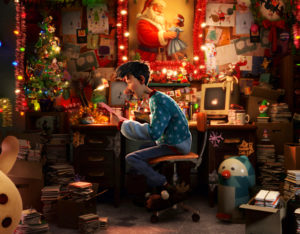
Is the whole Santa story a fun tradition that parents can keep perpetuating to keep the magic of Christmas alive or is lying to kids disrespectful? We ask other mums their thoughts plus a counsellor gives her advice
Many parents carry on the tradition of ‘keeping the magic of Christmas’ by telling their kids about Santa, and often going to extraordinary lengths to keep the story alive (meeting ‘Santa’ in person and finding ‘proof’ that he and his Elves exist). Then there’s the tradition of leaving milk and cookies out the night before his visit, some carrots for the reindeer perhaps, before tip-toeing to fill Christmas stockings with goodies at midnight and putting a few ‘from Santa with love’ presents (wrapped in different wrapping paper of course) under the Christmas tree. There is however a growing movement of parents taking a different approach. Some parents disagree with lying to kids about Santa (or anything) even if it is to preserve the magic and instead they choose to be honest with kids about Santa not being real. So which approach is ‘right’? We ask mums what approach they have taken with their kids plus a counsellor gives us her advice on the ‘best’ approach to take.
‘Is Santa Real?’: We asked mums what approach they have taken and if their kids believe
“My approach is to lie, lie, lie! Christmas is magical and I want to keep that alive for my children as long as possible – plus the Santa Threat gets rolled out around July in my house.” Kate A, mum of a 4-year-old and 3-year-old.
“After years of painstakingly keeping the magic alive my kids are now making ME believe they believe!! Because we all know Santa delivers!” Emilie, mum to a 12-year-old and 9-year-old.

“My 6-year-old has never come out and asked us whether or not Santa is real, and it hasn’t been a discussion amongst his peers. However, in our household, there are separate presents that come from mom and dad and from Santa. My son knows that mom and dad have a direct dial to Santa so “being a good boy” has some impact in our household. Pre Covid times, we used to visit Santa every year. My husband and I both grew up believing in Santa but once we out grew the belief, it wasn’t a big deal. I anticipate it happening with my son next year.” Kristen, mum to a 6-year-old and baby.
“My 10-year-old is 100% on to Santa. I think the seed of doubt was planted when she started questioning the existence of the tooth fairy. (My fault for forgetting to swap the tooth for money one night). Right up to the age of 8, she was all set with the cookies and a glass of milk on Christmas Eve. At age 9, when she started asking me questions about whether Santa was really real, I didn’t say yes or no. Instead I said “Do you think so? Do you really think he’s made up? Could you be right?”
So I guess you could say I allowed it to be pretty much child-led. I never denied nor affirmed the non-existence of Santa. I simply acknowledged that she may or may not be right, and that it was okay to ask those questions. This year, at age 10, she decided on her own that he doesn’t exist, but it was super fun to pretend he did, and she is determined to preserve that fantasy for her little brother. She happily wrote her Christmas Wish List out on Google docs, and emailed it to me, and not to Santa anymore.” Nadia, mum of a 10-year-old and 3-year-old.
“Telling children about magical reindeer and squeezing down chimneys feels like disrespecting their intelligence. I’m also bothered by the idea Santa only brings gifts for the good, and will punish – or at least shame – “bad” children. The last few years we have kept up the myth that there must be a Santa who magically leaves a bag with presents on our doorstep. I don’t feel comfortable lying to my kids any longer, but I also want to support them in their beliefs. The magic and wonder of childhood are fleeting, and I still want to encourage them while they last. I’ve started to tell my daughters how other families/different cultures celebrate Christmas, and started asking them which kinds of traditions and celebrations they want to create. We are changing our Christmas traditions. Santa won’t play a very active role any longer. He will live through magical stories, arts and crafts, pretend play and much more. But he is not the one bringing presents, or shaming anyone for not being good.” Mum of two who wrote ‘Why I’m Telling My Young Children the Truth about Santa’.

A counsellor’s thoughts on the Santa Myth
We asked Irena Constantin, Occupational & Educational Psychologist at Scott Psychological Centre Singapore her opinion.
Is it ‘Ok’ to tell our kids about Santa to keep the magic of Christmas alive or is lying disrespectful?
Fairy tales have had and still have an immense psychological meaning for children of all ages – so does the myth of Santa. Research shows that most parents still work very hard to perpetuate the myth of Santa. During those early years of a child up to age 7, their world is filled with magic and imagination (an example is how children often conjure up imaginary friends during that period of time). By the time they turn 7 most children have figured out the truth about the Christmas traditions parents maintain and most have positive reactions after learning the truth. They know Santa doesn’t exist, but they still want to hold on to the magic of Christmas.

If your family has had the tradition of Santa bringing presents, what should parents do when kids start asking “Is Santa real”?
When kids start asking questions: Listen carefully first. They may not actually be asking what you think they’re asking and may not be ready for the whole truth. So rather than responding immediately, try reaffirming the question.
Parents should make age-appropriate judgments about what information they want to share with their children at all times but they should support their children to come to their own natural conclusions about Santa within their own time. Around the age of 7 most children discover the ‘myth’ behind Santa. Most of them even feel a sense of pride over making that discovery. If you think your child has it all figured out, it’s a good idea to be truthful. For instance, you can explain that Saint Nicholas was, in fact, a real person from long ago. He was known for leaving presents for the children in his village and for caring for the less fortunate. The legend grew over time, becoming the story we all know today.
Keep in mind that research shows that even when children discover that Santa is not real, they still like the idea of Santa. A discovery about Santa doesn’t mean that your Christmas traditions are over. It simply means that the traditions will change.
Some parents use “Santa is watching, so be good” to check their children’s behaviour. Is there any harm in this?
The stress of the holiday season can often lead to increased behavioural problems at home with your kids; but getting kids motivated to behave for a stranger (Santa), versus for you, is an interesting concept. Saying ‘Santa is watching so be good’ instead of ‘I want you to be good’ may sound like your child should care more about Santa’s opinion than yours.
Rather than using a threat consider working on behaviour problems all year long and start implementing immediate consequences for misbehaviour (like time-out). That will be much more effective than the threat of ‘Santa’s watching’.
If you are concerned about your child being ungrateful, cancelling Christmas isn’t likely to change your child’s behaviour or attitude. Focus on teaching your child to behave because it’s the respectful thing to do, not because they won’t get rewarded on Christmas.
So mamas and dads, whether this is the year you’ll be sharing the truth, keeping up the Santa fun or whether you never embraced any of this make-believe with your kids, we hope your family enjoys a magically restful end of year together!






 View All
View All





 View All
View All








 View All
View All











